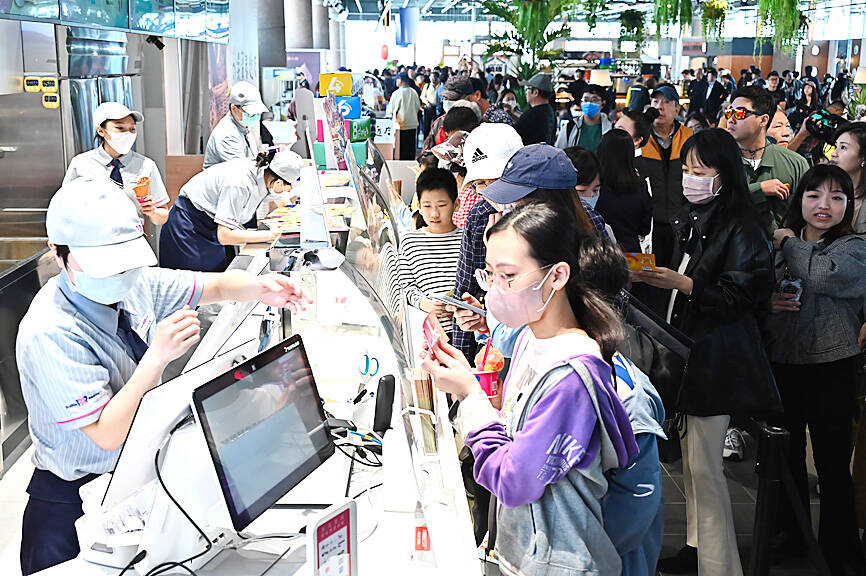Sales in the retail, and the food and beverage sectors in the first two months of this year rose to the highest for the period on record on the back of holiday shopping, the Ministry of Economic Affairs said yesterday.
Retail sales climbed 1.1 percent from a year earlier to NT$801.5 billion (US$24.23 billion) in the first two months, with vehicle and motorcycle vendors, drink and tobacco retailers, and pharmacies and cosmetics stores the main drivers, the ministry said in a report.
Food and beverage sales grew 4.1 percent in the period to NT$188.5 billion on across-the-board growth in restaurants, beverage outlets and catering service providers, the report said.

Photo: Lee Hui-chou, Taipei Times
The ministry released the data for the first two months to factor out the effects of the week-long Lunar New Year holiday — which was mostly in January this year, but was in February last year — when many businesses were closed.
However, the figures missed forecasts by the ministry, which had projected retail sales in the first two months to increase by 2.2 to 3.6 percent and by 5.1 percent to 6.6 percent in the food and beverage sector.
The ministry blamed the underperformance of the two sectors on an explosion at the Shin Kong Mitsukoshi Zhonggang department store in Taichung on Feb. 13, coupled with cold and wet weather, as well as a persistent tourism deficit.
This month, the ministry expects the two sectors to post annual sales growth, thanks to special sales promotions related to International Women’s Day, White Day — when men give reciprocal gifts to women who gave them Valentine’s Day gifts the month before — and other festive events, as well as the effects of new store openings and digital marketing strategies, the report said.
Retail sales are predicted to be between a 0.6 percent drop to a 2.4 percent gain from March last year to between NT$389.1 billion and NT$400.8 billion this month, while food and beverage sales are expected to increase 1.3 to 4.3 percent to between NT$84.2 billion and NT$86.7 billion, it said.
Sales generated by the wholesale sector increased 8.8 percent year-on-year to NT$2.14 trillion in the first two months, also the highest for the period and exceeding the ministry’s forecast of an annual increase of 3.9 to 5.2 percent, the report said.
The better-than-expected performance was mainly attributable to the machinery equipment industry, which posted a 21.2 percent year-on-year sales increase and registered its 14th consecutive month of growth, the report said.
For this month, sales for the wholesale sector are projected to increase 8 to 11 percent year-on-year to between NT$1.16 trillion and NT$1.19 trillion, the ministry added.

TAKING STOCK: A Taiwanese cookware firm in Vietnam urged customers to assess inventory or place orders early so shipments can reach the US while tariffs are paused Taiwanese businesses in Vietnam are exploring alternatives after the White House imposed a 46 percent import duty on Vietnamese goods, following US President Donald Trump’s announcement of “reciprocal” tariffs on the US’ trading partners. Lo Shih-liang (羅世良), chairman of Brico Industry Co (裕茂工業), a Taiwanese company that manufactures cast iron cookware and stove components in Vietnam, said that more than 40 percent of his business was tied to the US market, describing the constant US policy shifts as an emotional roller coaster. “I work during the day and stay up all night watching the news. I’ve been following US news until 3am

Six years ago, LVMH’s billionaire CEO Bernard Arnault and US President Donald Trump cut the blue ribbon on a factory in rural Texas that would make designer handbags for Louis Vuitton, one of the world’s best-known luxury brands. However, since the high-profile opening, the factory has faced a host of problems limiting production, 11 former Louis Vuitton employees said. The site has consistently ranked among the worst-performing for Louis Vuitton globally, “significantly” underperforming other facilities, said three former Louis Vuitton workers and a senior industry source, who cited internal rankings shared with staff. The plant’s problems — which have not

TARIFF CONCERNS: The chipmaker cited global uncertainty from US tariffs and a weakening economic outlook, but said its Singapore expansion remains on track Vanguard International Semiconductor Corp (世界先進), a foundry service provider specializing in producing power management and display driver chips, yesterday withdrew its full-year revenue projection of moderate growth for this year, as escalating US tariff tensions raised uncertainty and concern about a potential economic recession. The Hsinchu-based chipmaker in February said revenues this year would grow mildly from last year based on improving supply chain inventory levels and market demand. At the time, it also anticipated gradual quarter revenue growth. However, the US’ sweeping tariff policy has upended the industry’s supply chains and weakened economic prospects for the world economy, it said. “Now

COLLABORATION: Given Taiwan’s key position in global supply chains, the US firm is discussing strategies with local partners and clients to deal with global uncertainties Advanced Micro Devices Inc (AMD) yesterday said it is meeting with local ecosystem partners, including Taiwan Semiconductor Manufacturing Co (TSMC, 台積電), to discuss strategies, including long-term manufacturing, to navigate uncertainties such as US tariffs, as Taiwan occupies an important position in global supply chains. AMD chief executive officer Lisa Su (蘇姿丰) told reporters that Taiwan is an important part of the chip designer’s ecosystem and she is discussing with partners and customers in Taiwan to forge strong collaborations on different areas during this critical period. AMD has just become the first artificial-intelligence (AI) server chip customer of TSMC to utilize its advanced